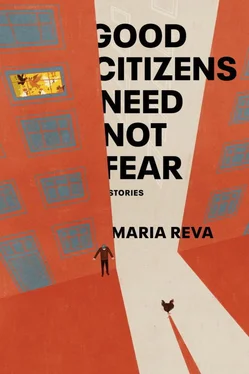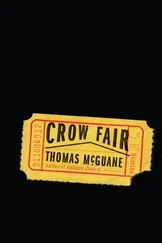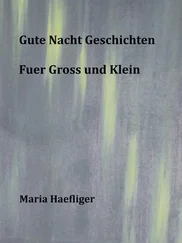“Am I getting through?” the doctor asks. He’s taut-bellied himself, with brown nicotine stains on his lips.
The grandparents nod along, but the gravity of the diagnosis has never quite sunk in. It just doesn’t make sense, how a pea can metamorphose into a chestnut, then a lemon.
“Can we keep the lemon?” Pyotr asks.
—
At their sales stall, the grandparents keep a pair of flashlights. Tourists shine them through the X-ray records. Sometimes the reason for the X-ray is obvious: a broken limb, a spoon floating in a stomach. Other times, the X-ray shows a subtle swelling, a hairline fracture. The tourists enjoy the detective work.
For the layperson, Pyotr’s tumor isn’t easy to identify. Lila has to trace the faint orb above the bladder with her finger before the tourists say “Ah.” She never attributes the tumor to her husband, sitting right beside her, so as not to dampen anyone’s mood.
As with any growth or deformity, the tourists always want to know: “A victim of…?” The tourists don’t want to say the dirty word themselves, but are itching to hear it, pronounced authentically by this kerchiefed babushka.
Lila casts down her eyes, confirms: “Chernobyl.”
She says this even though her husband never served in Chernobyl or had anything to do with it. The most he’d done was help hose off their apartment building, as per government recommendations, but the spray of the garden hose only reached the second floor, and they lived on the third, so who knew how much of the fallout they’d absorbed? The government had also recommended they drink wine to protect against the radiation, but the grandparents didn’t have wine themselves and didn’t know anyone so fancy. Pyotr’s skin hadn’t melted off like that poor woman’s had, the one on the local news—she’d bathed in one of the rivers—but no one can prove that he isn’t a victim. And the people who might take issue with the misuse of the term, the ones most territorial about it, tend to be dead.
Anyway, at the word “Chernobyl,” the tourists have their wallets out.
—
The grandparents are eating nettle soup when they spot the roach sitting right above them, on the kitchen ceiling. Its silver chain swings back and forth as though to hypnotize them. Pyotr drops his spoon into his soup.
The lid of the tin box must have come open when Lila shoved it into the closet. But she doesn’t want to be the one to put the roach back in the box.
Pyotr won’t put it back either, even though pests are his domain, his only domain, while Lila cooks, cleans, and all the rest.
The roach stays on the ceiling, and the grandparents endure their meal.
They make sure not to leave any food out, hoping that the thing will leave the apartment on its own. But in the coming weeks, every time they think it’s finally gone, it skulks out from under the stove or shoe rack, from between their clothes in the wardrobe, the chain dragging behind it.
—
What if something were to happen to the grandparents? Say they were to perish in a fire. Just last month, a sickeningly sweet smoke rose through the vents from one of the suites below, pouring into theirs, and Lila threw her best linens from the balcony to save them. Or the grandparents might succumb to gas poisoning. At this very moment, they could be two blue corpses splayed out on the floor—and the rest of the family wouldn’t know it.
These past few weeks, no one has checked in.
Or maybe the family has tried to check in but the grandparents couldn’t hear the phone ring over the roaring music.
“YOU’RE A TENDER LILY,” the record player shrieks, “STUCK TO THE BOTTOM OF MY BOOT.”
Maybe the family tried sending a letter, but the new mailman can’t find the grandparents’ building because some idiot chiseled the numbers out of the concrete beside the entrance all those years ago. Pyotr borrows a pink piece of chalk from the children hopscotching on the road, braves the crowd of pilgrims at the front of the building, and writes a large blocky “1933” above where the stenciled numbers used to be.
The family may even have tried to visit, but didn’t knock loudly enough. Lila posts a note on the door: KNOCK LOUDLY. The grandmother’s own grandmother had a sign like that on her gate in the village: KNOCK HARD OR THROW A ROCK AT THE DOG. At least she had a dog. All the grandparents have is this oversize roach.
And don’t any of their children have a spare key? Maybe Lila should mail one of the daughters a spare key—just a key, no note or any other sign of life.
“Maybe we should just call everyone,” Pyotr suggests. “Make sure they haven’t been trying to check on us.”
“Then what? They’ll hear from us and won’t need to check on us.”
By having all these children, Pyotr and Lila thought they’d buffered themselves against isolation. Instead, the grandparents don’t have friends because of all the time they put into the children. First came the sons, which Pyotr and Lila kept having until, finally, came the daughters. Daughters are supposed to stick around, help out. But now all the daughters live just as far away as the sons, in big cities with job prospects, busy caring for their own children, believing those children will stick around.
—
Maybe it’s a law of physics. Once a baby is expelled, it will keep moving away at a constant speed unless acted upon.
Not that the grandparents will act first.
—
To repurpose the tin box, Lila yanks out the newspaper lining. Under the lining she discovers a glossy pamphlet featuring a photo of a fine-boned man in a plum blazer. Tethered to his lapel is a rock-laden insect just like the one the grandparents received. It emits a dull sheen, like a dusty brooch. Lila can’t understand why anyone would wear a cockroach.
The Madagascar hissing cockroach, the manual explains. They breed under rotting jungle logs. The embellishments on their carapaces are among the rarest gems in the world: serendibite, in its uncut form.
“Serendibite,” Lila repeats.
Rarer than diamonds, the manual insists. Infinitely more valuable. And on your pet, priceless.
—
When was the last time the grandparents saw the roach? Last week? Last month? They’re ready to tear the whole apartment apart.
“The last piece of our grandson,” Lila laments.
“His most beloved pet,” says Pyotr. “And we lost it.”
They find it two minutes later, drinking from a leaky valve under the kitchen sink. Lila plucks the roach off by the chain and it pirouettes in the air. In the strong midday light, its gems give off a bronze glint. The grandparents marvel at them.
When Lila lowers the insect into its tin box, Pyotr asks, “What now?”
“We care for it like we cared for our grandson,” says Lila. Unpleasant as the grandson was as a child—with his mercurial stomach, his bulge-eyed tantrums—they never gave up.
—
The Madagascar hissing cockroach makes the easiest pet, the manual assures the grandparents. The Madagascar hissing cockroach is perfectly content with the simplest foods, like carrots! But it always loves a taste of home: guavas and papayas, lightly rotten.
The grandparents don’t know what guavas and papayas look like, so assume they are expensive.
Provide plenty of water, to be replaced daily, the manual instructs. To mitigate the risk of drowning, place a sponge in the bowl, to be replaced weekly.
The grandparents don’t use sponges themselves, only rags from old underwear.
The Madagascar hissing cockroach does not like direct sunlight, the manual warns. Wear the roach brooch only at night, otherwise your pet will burrow down your collar or into your hair.
Читать дальше












